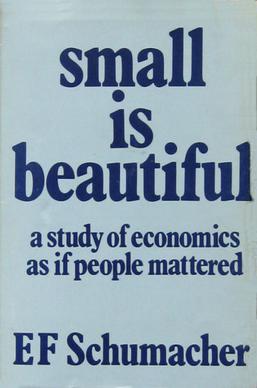
Small Is Beautiful
Small Is Beautiful: A Study of Economics As If People Mattered is a collection of essays published in 1973 by German-born British economist E. F. Schumacher. The title "Small Is Beautiful" came from a principle espoused by Schumacher's teacher Leopold Kohr[1] (1909–1994) advancing small, appropriate technologies, policies, and polities as a superior alternative to the mainstream ethos of "bigger is better".
Author
Blond & Briggs (1973–2010), HarperCollins (2010–present)
1973
Print (Hardcover)
288 pages
330.1 20
HB171 .S384 1989
Overlapping environmental, social, and economic forces such as the 1973 energy crisis and popularisation of the concept of globalisation helped bring Schumacher's Small Is Beautiful critiques of mainstream economics to a wider audience during the 1970s. In 1995 The Times Literary Supplement ranked Small Is Beautiful among the 100 most influential books published since World War II.[2] A further edition with commentaries was published in 1999.[3]
Honoring the 50th anniversary of Small is Beautiful in 2023, the Schumacher Center for a New Economics commissioned an updated study guide from British author and Journalist David Boyle.[4]
Small Is Beautiful is divided into four parts: "The Modern World", "Resources", "The Third World", and "Organization and Ownership".